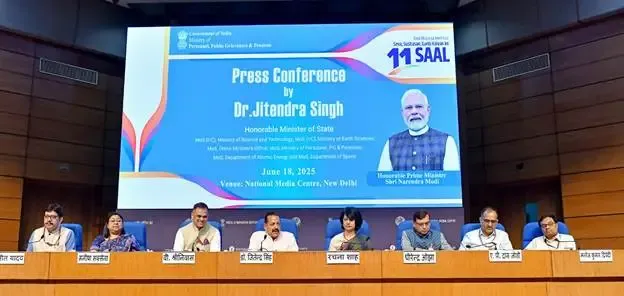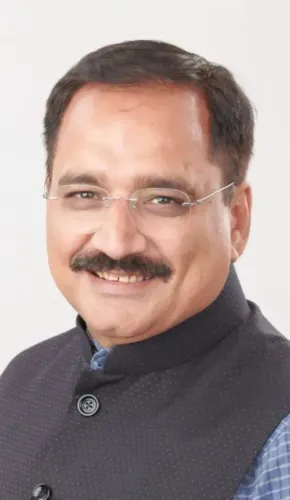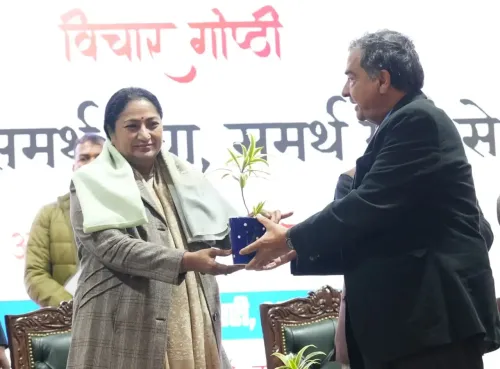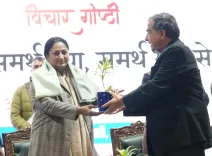Are Govt Staff Under Unified Pension Scheme Eligible for Gratuity Benefits?

Synopsis
Key Takeaways
- Central government employees under the Unified Pension Scheme are now eligible for gratuity benefits.
- The reform addresses significant demands for social security.
- Over 1,600 outdated regulations have been repealed.
- The introduction of digital solutions like the life certificate enhances service delivery.
- Capacity building initiatives aim to improve public service standards.
New Delhi, June 18 (NationPress) Central government employees who fall under the Unified Pension Scheme will now qualify for retirement and death gratuity benefits, as announced by Union Minister of State (Independent Charge) for Personnel, Public Grievances, and Pensions, Dr Jitendra Singh, on Wednesday.
The minister stated that this initiative addresses a crucial demand from government personnel and establishes parity in retirement benefits. This provision embodies the government’s dedication to ensuring social security for all employee categories within the National Pension System, he elaborated.
Dr Jitendra Singh emphasized the accomplishments of the Ministry of Personnel, Public Grievances, and Pensions over the past eleven years, showcasing a series of reforms focused on simplifying governance, empowering citizens, and enhancing administration.
During a commemorative gathering at the National Media Centre, the minister categorized the ministry’s efforts into four primary areas that reflect the evolving nature of governance under the Modi administration.
"For the first time since Independence, a government has prioritized eliminating obsolete rules instead of adding new ones," he remarked, highlighting the abolition of over 1,600 outdated regulations—many dating back to colonial times—as a clear message of trust in citizens, particularly India’s youth. The decision to make job interviews non-evaluative for specific categories, announced by the Prime Minister during the Independence Day speech and implemented nationwide by January 2016, was highlighted as a significant step towards fairness and transparency in recruitment.
Dr Singh pointed out that numerous reforms from the Ministry extend beyond administrative ease, carrying broader socio-cultural implications. Adjustments to the Prevention of Corruption Act aimed to balance accountability with safeguarding well-performing officials, while changes in handling unfair means in examinations were designed to protect students from the consequences of organized cheating.
He mentioned that human-centric reforms constituted the third pillar of the Ministry’s initiatives, recounting how many changes were inspired by firsthand experiences of insensitivity in existing regulations. The introduction of a digital life certificate for pensioners, reforms to family pension norms to include divorced and separated daughters, and extending maternity leave to include stillbirth cases were among the examples he provided.
“We merged human concern with technology to develop solutions that honor individual dignity,” he noted, recalling how over 19,000 long-delayed promotions were expedited to alleviate the burden on officials who had not received timely career advancement. These initiatives, he asserted, embody an approach that considers policy through an empathetic lens.
In highlighting innovation as the fourth critical area, the Minister stated that various governance reforms have embraced creative thinking and technological adaptability. The establishment of the Capacity Building Commission and the launch of the iGOT-Karmayogi platform were referred to as game-changers in equipping civil servants for real-world challenges.
The CPGRAMS grievance redressal portal, which currently processes over 2.6 million complaints annually with a disposal rate of 95-96 percent, exemplifies how citizen expectations have evolved in response to responsive governance.
"We have transitioned from red tape to real-time responses, from mere file-pushing to feedback-oriented policy," Dr Singh remarked, noting that these reforms signify a considerable shift in the governance ethos of New India.
During the press conference, he also unveiled several key publications and digital initiatives. These included achievement booklets from the past eleven years for the DoPT, the DARPG, and the DoPPW, providing a comprehensive overview of reforms and milestones across these departments.
The minister also introduced the Guidelines for the Special Campaign for Family Pensioners’ Grievances, a Compendium of Circulars covering the period from August 2024 to June 2025, and a set of circulars related to Central Civil Services regulations. Additionally, to bolster capacity building within the system, Dr Singh virtually launched the Sevottam Training Modules, which aim to institutionalize excellence in public service delivery.










